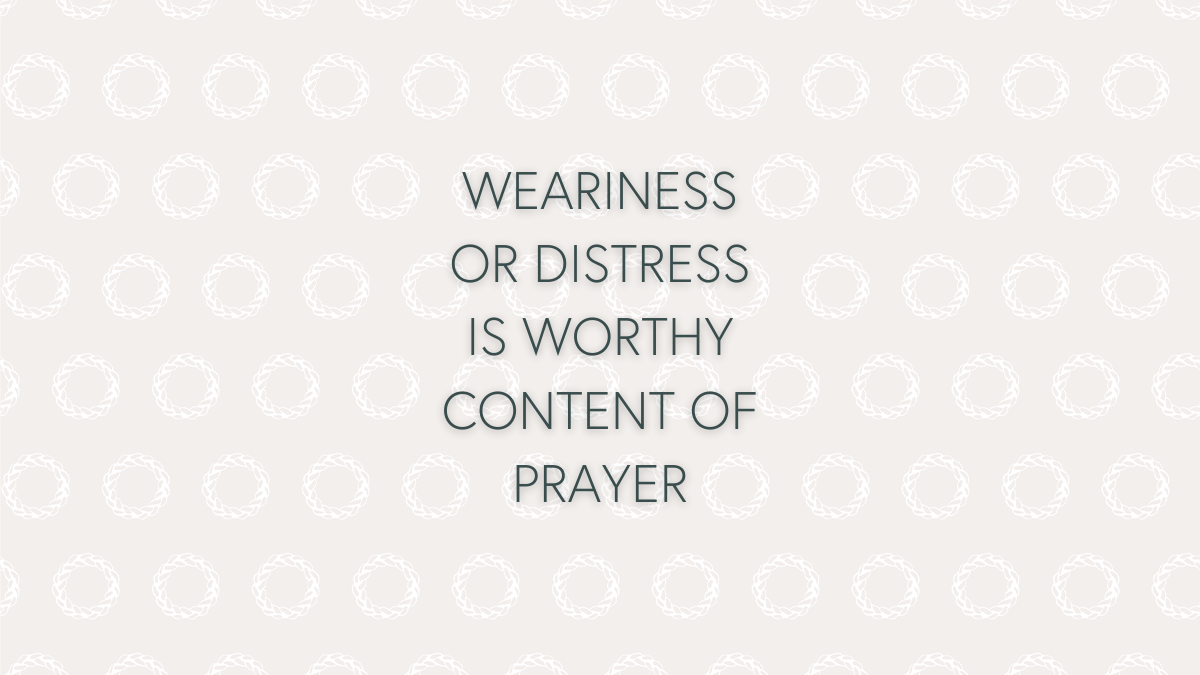I am delighted to welcome Michele Morin sharing with us. If you are feeling weary and overwhelmed and having doubts about the words to use when you pray, then Michele reassures through her own praying life how God’s heart welcomes your real words.
I woke to the sound of my youngest son calling me.
“Muuuum…”
His tone told me everything I needed to know. He was sick, likely nauseated, and he needed help. I sat up in bed, ready to rush to his aid.
As my feet hit the floor, my head cleared, and two facts crowded into my sleepy brain:
1. I had been hearing my husband’s rhythmic breathing, not my son’s calling.
2. My son was not sleeping upstairs. He was over 1,000 miles away (15 hours by car), likely sound asleep in a U.S. Army barracks.
Settling back into cozy sheets and a quiet house, I prayed for my far-away son, and the message of that middle-of-the-night parable was warm beside me: A mother’s hearing, tuned to her child’s voice and need, is a pale shadow when compared to God’s attentiveness to our prayers.
The welcoming heart of God is at the center of the gospel, and it’s at the center of a praying life. When Jesus offered the invitation, “Come to me, all who are weary and burdened and I will give you rest” (Matthew 11:28), it was not a want ad for the pulled-together and the omni-competent. In A Praying Life, his classic book on prayer, Paul Miller expounds upon the verse this way:
“The criteria for coming to Jesus is weariness. Come overwhelmed with life. Come with your wandering mind. Come messy.”
GOD WANTS TO HEAR YOUR REAL WORDS
Often the first words out of my mouth and into God’s ears are, “I’m not feeling very spiritual this morning.” God already knows, of course, but it helps me to just put that out there on the table.
If relationship is the basis for our faith, then it’s the basis for our praying life, so it’s clear that God wants to hear my real words when I come to him. Particularly if I am able to say them out loud, the practice of distilling images and emotions into concrete sentences and complete thoughts helps me to be more specific, to hear the content of my requests and the cadence of my worship.
I bring my own real words to God in prayer, but I am also learning to borrow the real words of others. Those from a more liturgical tradition than mine are well aware of the historical written prayers of the church, but others may have been warned against them as empty rote. Remember, though, it’s not repetition itself Jesus cautioned his hearers about in the Sermon on the Mount (Matthew 6:7). It was vain repetition or empty words.
Therefore, if with an engaged heart and mind, I pray, “Lighten our darkness, we beseech Thee, O Lord, and by Thy great mercy, defend us from all perils and dangers of this night…,” I am filling up those ancient borrowed words with meaning, and they become mine to carry fear and dread to the heart of a waiting Father.
The real me meets the real God in words that have been handed down lovingly through history in an evening prayer.
With this mindset, obstacles to prayer such as mental distraction, fuzzy thinking, or worry are no longer barriers, but instead become the basis upon which the believer meets with God.
Weariness or distress is worthy content for prayer as we offer up our true selves from the heart.
My real words can frame my concern for a family member. Discouragement over lack of progress toward my goals becomes part of my honest expression to a loving God who is already well-acquainted with my grief. In the process, my vague feeling of being “too distracted to pray” becomes a compelling reason to pray.
As I hand my concerns over to God, I find peace and reinforce my understanding of God’s attentiveness and care. God’s ear is always tuned to the sound of his children’s voices. When we come to him carrying nothing but our need, admitting that we are “weary and burdened,” we have truly begun to pray.
___________
Michele Morin is a wife, Mum to four great men and two daughters-in-love, and Bam to three adorable grandchildren. Active in educational ministries with the church she calls home, Michele writes, speaks, and teaches from a desire to see women become Christ followers & students of God’s Word. She writes every week about the books she is reading and the grace she is receiving at Living Our Days, and you can connect with her on Facebook, Twitter, or Instagram.
Photo by Axel Holen on Unsplash



So the main thing is to not pray empty words … when I first came to Christ, I tried praying in the King James’ English. So glad I’ve learned we can talk to Him the same way we speak to friends.
That’s such an important point, Jerralea! While I have known precious saints who met meaningfully with God through gorgeous archaic English, God is not weighing our “prayer language ” aptitude when we come to him.
It’s amazing to think the God of the universe invites us to come to Him. He inclines His ear to hear every word – whether ancient words or the ones on our hearts. Thank you for encouraging us to pray, continually.
I am always in a learning curve when it comes to prayer, and sometimes it feels as if I keep writing the same article, over and over again, because I keep needing the review!
I love that we can speak to God with whatever words are on our heart, but we can also pray ancient words meaningfully. And His ear is turned towards His children’s faintest cry.
His unwavering attention is miraculous!
“Discouragement over lack of progress toward my goals becomes part of my honest expression to a loving God who is already well-acquainted with my grief. In the process, my vague feeling of being “too distracted to pray” becomes a compelling reason to pray.” I have been discouraged over my progress (lack of)! You have encouraged me to take the next step to pray to the One who already knows! Thank you, Michelle!
Lynn, that’s wonderful! Our neediness is a powerful basis for connection with Divine provision!
So very good.
Hi, Lisa! Thank you for reading!